In mid-March 2021, a team of five adventurers will say “see you later” to their families and friends, get on a plane, and be dropped off on Ward Hunt Island (Canada's northernmost point of land). This place, known for being polar bear territory, is located 800 km south of the North Pole (83rd parallel), and is where the team will start their day one out of a seven months expedition.
Expedition AKOR has been in the making for three years and is the first of its kind - a complete crossing of Canada from its northernmost to its southernmost point (Pointe-Pelée at Lake Erie in Ontario, Canada), enabled by mere human power (no support by motor, sail or similar) to be completed without interruption. This means covering a total distance of 8000 km, managing three means of travel; ski, canoe, and bike with the transitions included. Hillsound is a proud supporter of this expedition propelled by the drive to explore the remoteness, where they will contribute to science as well as education.
How it all started...
The idea for this epic expedition was planted in 2018, when the crew (different constellation) met an Inuit Guide who used to study at Thompson River University, BC, Canada. He told them about a project he finalised as part of his education - an expedition plan for crossing Canada from South to North. The plan was never executed on and he said "if you want to do something that has never been done before, this is it". As adventurers they were. and still are - Team AKOR took on the challenge. They started to explore whether a trip like this was even feasible by turning to Polar Adventurers and Inuit people who know the land better than anybody else. They ended up rerouting the crossing to go from North to South, and by doing so, secured icy straits which will enable them to pull their sleds across by skies or, if needed, crampons.
Prep time
Planning, preparing, and executing on an expedition like this is highly complex - even more so when you manage all aspects of it yourself while balancing family time and jobs, as well as a pandemic to consider. The team constellation has changed over the past years and most recently, also, due to COVID-19. Julien Bilodeau and François Brassard had to drop off due to their physical problems and economic environment linked to COVID-19. However, they were able to welcome three new crew members over the same period; Jacob Racine, Etienne Desbois, and Philippe Voghel-Robert. Today, the team adds up to totally five adventures with various responsibilities and backgrounds (see below). Two of them will complete the full crossing, and the others will complete either the canoe or skiing section.
Signing up for an expedition like this involves lots of dedication and sacrifices - something you have to either accept or don't. All gear, logistics (including access to National Parks), and supplies need to be sorted, and months long training expedition trips need to be ticked off, scientific programs / sponsor partnerships managed, all while working on your own physical and mental preparations. They have managed to gather all gear, most logistics, and partial food supplies (still going to dehydrate some of their own meals) while keeping on track with their budget. With a total budget of $200,000 CAD, they 'only' have $25,000 CAD left to secure to cover their flight tickets.
The first 3.5 months when skiing in the Canadian High Arctic Archipelago is foreseen to be the most challenging part of the expedition. The biking portion is more so a way to slowly come back to civilization. The team has been on two training expeditions so far. The most recent one took place at the Manicouagan Reservoir in Central Quebec, Canada and involved some 240 km of travel by skis. The main purpose of this trip was to get accustomed to the extreme cold (down to -40°C) and consolidate all relevant experiences including any amateur mistakes. The training expeditions are seen as an opportunity to make mistakes - which is a part of the normal learning process leading up to the major expedition, where there is very little allowance for mistakes. No one got frostbite on this trip, but they all learned that it doesn’t take more than 10 seconds in windy conditions before the temperature literally gets your fingers.
Campsite on the Manicouagan Reservoir.
Crossing icy sections (ice compression ridges) on the Manicouagan Reservoir. Pulling a sled of 175 lbs is not always easy! Nicholas in the photo.
The second trip started in early June 2018. It took them 65 days to complete a total of 600 km by canoe, crossing Nunavik, Quebec, Canada. This journey took them down to Torngat Mountains (Labrador) and the Atlantic Ocean - a route which forced them to negotiate with icebergs and to cohabit with polar bears (the largest land carnivore). The team rotated the night watch shifts and had no other choice than to carry guns in order to stay safe. They faced polar bears every day during this trip. The irony was, that the best suited camp spots; grassy meadows and access to creek water was also where the polar bears wanted to hang out both daytime and nighttime;
"Polar bears are so sneaky, ghostlike creatures - one cannot smell them or see them until they decide to appear. They used to swim silently nighttime near our campsite and also move in ice compression crest/ridge areas and be completely camouflaged (white on white). They are masters of hiding and their predators are also their prey - very tricky to deal with. Things could go sideways in a few seconds".
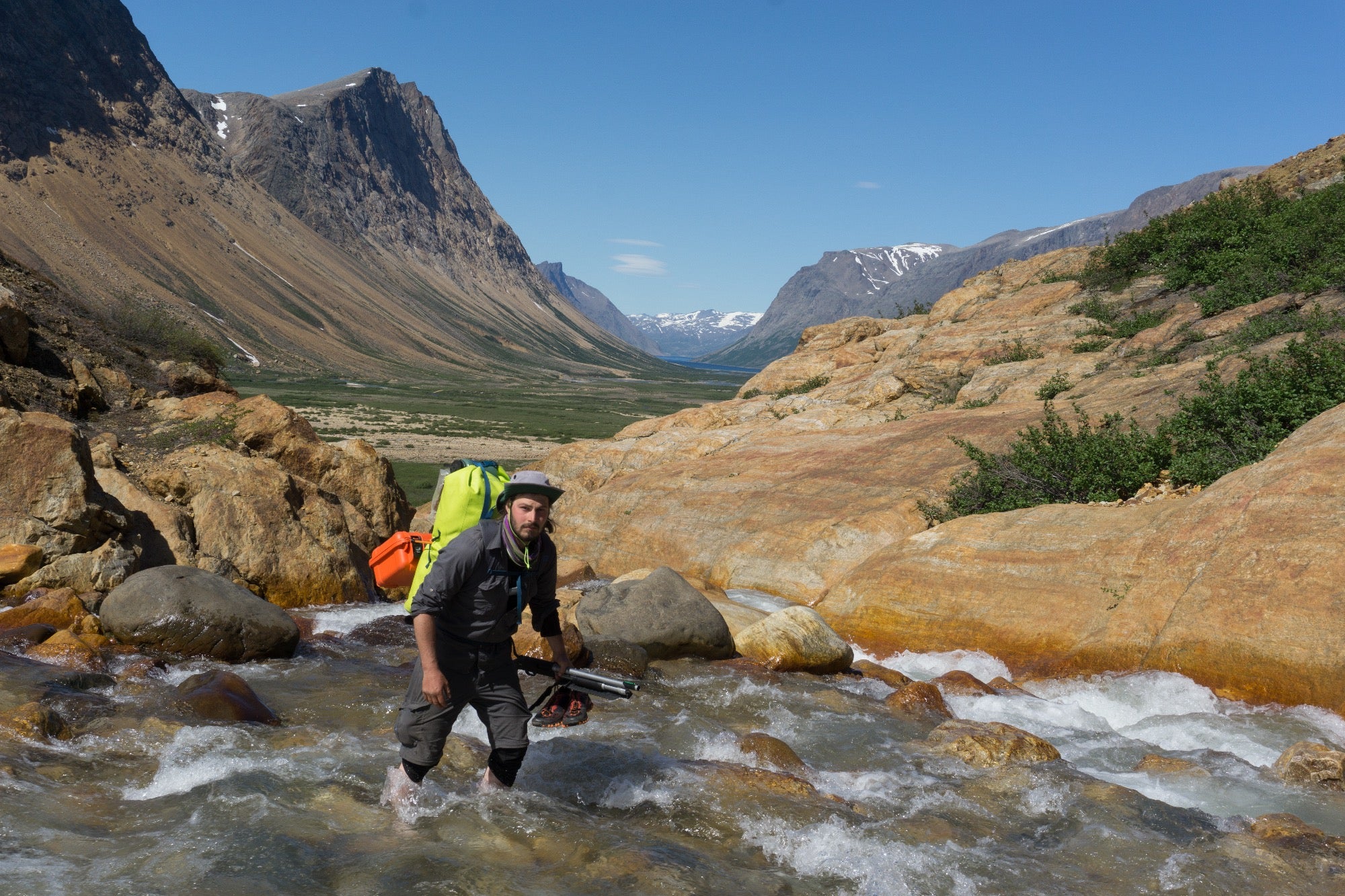
Torngat Mountains in 2018 (southern tip of the Arctic Cordillera), in Labrador, in the middle of the ascent of Mount Caubvik, the highest peak in Quebec. Note that this is polar bear region. In the photo: Guillaume Moreau.
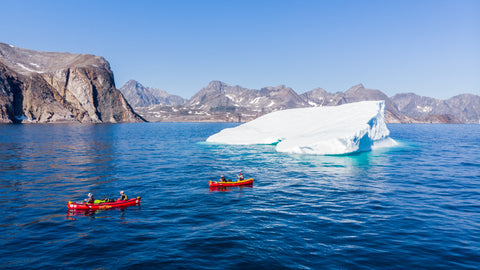
Passage on the coast of Labrador, in the Atlantic Ocean in 2018. They paddled 600 km along these steep cliffs manoeuvring icebergs and facing polar bears. The most physically and mentally demanding experience of their lives. In photo: Nicolas Roulx, Guillaume Moreau, Charles Fortin (Team Member in 2018) and Pier-Luc Morissette (Team Member in 2018).
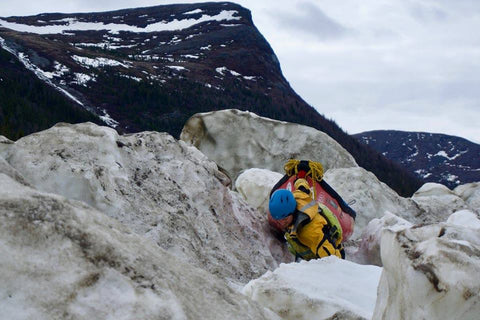
George River in 2018, in the middle of the spring breakup. The size of the rapids often meant that they had to portage them, but huge blocks of ice were in the way. In photo: Pier-Luc Morissette in the photo (Team Member in 2018).
The main lesson learned from both of these training expeditions has been that adaptability is key. You have to physically gain weight, monitor your body composition - exercise hard but not too much cardio (know they will lose some 20 pounds), and be on a suited nutrition plan. Mentally, you need to work hard on visualisation as every little detail needs to be concrete - all moves need to be precise. You cannot afford to waste energy and you must stay warm. This dictates how much you carry, how you deal with cooking breaks, what type of gloves you are wearing etc. Being in a polar bear region for so long as they were during the training expedition and will be during this coming expedition forces them to mentally manage hypervigilance - it is a strange feeling of being hunted/watched. Due to the low temperatures, night watches are not going to be an option, and for this particular reason, they will be using an electric fence as well as a visual and audio alarm system to stay safe. Guns are only seen as a last resort. All team members will keep a technical diary and report back to the base in Quebec City to fulfil their scientific commitments, and also make sure they are on track geographically. It will consist of short and consistent notes and most likely remind them of the mental state of the specific days if / when they look back at them at the end of next year.
A legendary expedition is about to get real. As most of us, the AKOR Team has switched over to communicating virtually, and the countdown has begun; as we write this, they have five months left before it's time to leave civilization. Focus moving forward the coming months will be to prepare physically - gain body mass; muscles and fat. And also to hopefully gather funds to cover their flight tickets. They are currently seeking out various grants options through publications and government.
Line-up of the Expedition AKOR crew
- Nicolas Roulx: Responsible for gear/equipment and PR. Will complete the full expedition. Professional backgrounds include working as a Teacher, Canoe Expedition Guide, Wilderness First Responder
- Guillaume Moreau: Responsible for logistics & supplies (including how to access National Parks). Will complete the full expedition. Professional backgrounds include working as a Forester, Doctorate in forest sciences (Ph.D.) at Laval University, Adventure Guide, Teacher (educating young people about the outdoors
- Philippe Voghel-Robert: Will help to prepare food prior to take off. Will complete the canoe section of the expedition. Professional backgrounds include working as a Teacher / Outdoor Technician (educating young people about the outdoors)
- Etienne Desbois: Will help to prepare food prior to take off. Will complete the canoe section of the expedition. Background in reforestation.
- Jacob Racine: Responsible for safety logistics. Will complete the skiing section of the expedition. Professional backgrounds include working as a Adventure Tourism Guide
Tips!
- To read more their scientific commitments - click here
- What to support the expedition? Then purchase your kilometres by clicking here
- Listen to their podcast - click here
Follow the crew in social media:
---
Hillsound has sponsored the team with Trail Crampon Ultras as a complement to skis when moving across potential icy sections (pulling their sleds).







![Expedition AKOR - The Countdown - [Canada] Hillsound Equipment](http://hillsound-equipment.myshopify.com/cdn/shop/articles/expedition-akor-the-countdown-657735.jpg?v=1678145395&width=1200)
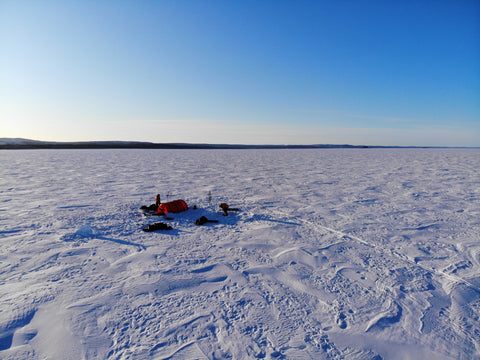
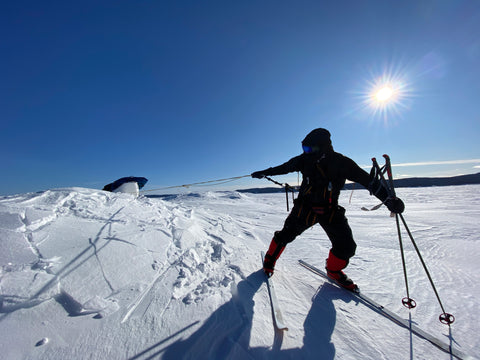
![Which Hillsound Crampon is Right for Your Winter Adventure? - [Canada] Hillsound Equipment](http://hillsound-equipment.myshopify.com/cdn/shop/articles/which-hillsound-crampon-is-right-for-your-winter-adventure-231615.jpg?v=1729689708&width=1080)
![The Best Backpacking Recipe Guide: Delicious Meals for Outdoor Adventures - [Canada] Hillsound Equipment](http://hillsound-equipment.myshopify.com/cdn/shop/articles/the-best-backpacking-recipe-guide-delicious-meals-for-outdoor-adventures-377677.jpg?v=1696535700&width=1080)
![Celebrating LGBTQ+ Outdoor Instagram Content Creators for Pride Month - [Canada] Hillsound Equipment](http://hillsound-equipment.myshopify.com/cdn/shop/articles/celebrating-lgbtq-outdoor-instagram-content-creators-for-pride-month-807396.jpg?v=1685693488&width=1080)
Leave a comment